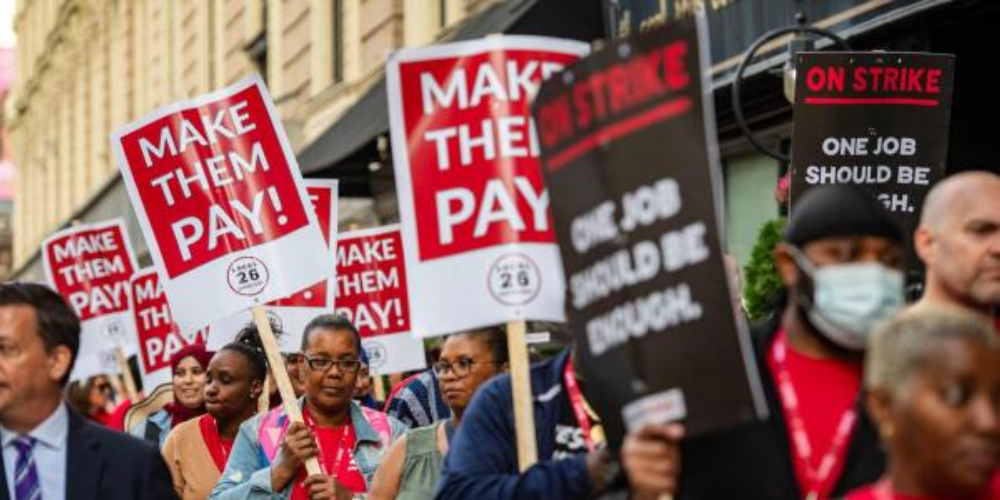In a historic display of solidarity, more than 10,000 hotel workers from major chains like Hilton, Hyatt, and Marriott took to the streets over Labor Day weekend, walking off the job and onto the picket line. This strike, organized by the powerful union Unite Here, marks a significant moment in the ongoing battle for fair wages, improved working conditions, and respect in an industry that has long been under scrutiny for its labor practices.
The Background: A Perfect Storm for Labor Action
The timing of this strike is no coincidence. Labor Day weekend, traditionally one of the busiest times for the hospitality industry, presented a strategic opportunity for workers to make their voices heard. As hotels braced for an influx of guests, the absence of thousands of workers sent a clear message: the status quo is no longer acceptable.
Unite Here, representing more than 300,000 hospitality workers across the United States and Canada, has been at the forefront of advocating for hotel workers’ rights. The union’s demands are straightforward but critical: higher wages, better health benefits, safer working conditions, and protections against the increasing reliance on automation that threatens job security. The strike reflects the growing frustration among workers who feel left behind in an industry that has seen record profits, especially as travel rebounds post-pandemic.
The Catalyst: Why Workers Are Striking Now
The decision to strike was not made lightly. For months, negotiations between hotel management and union representatives have been at a standstill. Workers are calling for a significant wage increase to keep pace with the rising cost of living in major cities like Los Angeles, San Francisco, Chicago, and New York, where the cost of housing, food, and transportation has skyrocketed.
Additionally, the pandemic exposed and exacerbated long-standing issues within the hospitality industry. Many hotel workers faced hazardous working conditions, inadequate protective measures, and reduced hours during the height of COVID-19. As the industry rebounds, workers are demanding that their sacrifices be recognized with fair compensation and improved conditions.
Another major concern is the increasing use of automation and technology in hotels, which has led to job cuts and added stress for remaining employees. Housekeeping staff, for example, are expected to clean more rooms in less time because automated systems monitor their performance. Workers argue that managers use these technologies to justify reducing staff while increasing workloads, making their jobs more physically demanding and mentally exhausting.
The Impact: Disruptions and Solidarity
The impact of the strike has been immediate and widespread. Hotels in major cities have reported disruptions in services, with some unable to accommodate guests due to the lack of staff. Guests have experienced delays in check-ins, reduced room cleaning services, and limited access to amenities like restaurants and spas. These inconveniences have not gone unnoticed, with many guests expressing support for the workers’ demands.
Public opinion has largely favored the striking workers, with many recognizing the essential role they play in ensuring a pleasant hotel experience. Social media has been flooded with messages of solidarity, and local communities have rallied behind the workers, offering food, water, and other support at picket lines. The strike has also garnered attention from politicians and celebrities, who have voiced their support for the workers’ cause and called on hotel management to negotiate in good faith.
The Broader Implications: A Turning Point for the Industry?
This strike is not just about better pay and working conditions for hotel workers; it has the potential to be a turning point for the entire hospitality industry. If successful, it could set a precedent for other sectors where low wages and poor working conditions are prevalent. The strike also highlights the growing power of organized labor in the United States, as workers across various industries demand fair treatment and a larger share of the profits they help generate.
The hospitality industry, known for its high turnover rates and reliance on low-wage workers, may need to rethink its business model in response to this strike. Hotel chains that once prioritized shareholder profits and cost-cutting measures may find themselves facing a labor shortage if they do not address the legitimate concerns of their workforce.
Moreover, this strike could inspire similar actions in other cities and industries. Workers in other sectors are closely watching the outcome of this strike, and a victory for hotel workers could embolden others to demand better conditions and wages. It also sends a clear message to employers that the era of exploiting low-wage workers is coming to an end, and that employees are willing to take collective action to secure their rights.
What’s Next: The Road Ahead
As the strike continues, all eyes are on the negotiations between Unite Here and hotel management. Both sides are under pressure to reach an agreement, with management keen to avoid further disruptions and workers determined to secure the improvements they have long fought for. The outcome of these negotiations will likely have lasting implications for the hospitality industry and could shape the future of labor relations in the United States.
In the meantime, workers remain steadfast on the picket lines, united in their resolve to achieve a fair deal. The strike has already succeeded in raising awareness about the challenges faced by hotel workers and has put significant pressure on hotel chains to reconsider their labor practices.
Conclusion
The thousands of U.S. hotel workers who walked out in strike action over Labor Day weekend have captured the nation’s attention. Their demands for better pay, safer working conditions, and job security are not just about improving their own lives, but about setting a new standard for the industry as a whole. As negotiations continue, the outcome of this strike could signal a significant shift in how the hospitality industry treats its workers, with potential ripple effects across the broader labor market.


